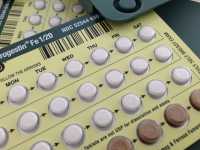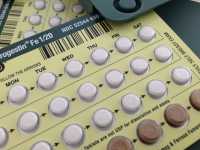Author Interviews, Diabetes, Endocrinology, Menopause / 18.09.2019
How Do Puberty, Menopause and BCPs Affect Risk of Diabetes?
MedicalResearch.com Interview with:
 Dr Sopio Tatulashvili
Avicenne Hospital
Bobigny, France
MedicalResearch.com: What is the background for this study?
Response: Diabetes and pre-diabetes are associated with increased cardiovascular morbidity and mortality. Early screening and the treatment of glucose metabolism disorders could lower the risk of further complications. Furthermore, type 2 diabetes can be prevented. For this purpose, it is of major importance to better identify the risk factors of type 2 diabetes. Hormonal factors are increasingly suspected to play a role in the etiology of type 2 diabetes. The aim of this study was to determine the associations between various hormonal factors and the risk of incident type 2 diabetes in the large prospective female E3N (Etude Épidémiologique de Femmes de la Mutuelle Générale de L’Education Nationale) cohort study. Based on a very detailed set of information available in 83,799 women from the large prospective E3N cohort study followed for 22 years, we have been able to clarify the relationships between various hormonal factors and type 2 diabetes risk. (more…)
Dr Sopio Tatulashvili
Avicenne Hospital
Bobigny, France
MedicalResearch.com: What is the background for this study?
Response: Diabetes and pre-diabetes are associated with increased cardiovascular morbidity and mortality. Early screening and the treatment of glucose metabolism disorders could lower the risk of further complications. Furthermore, type 2 diabetes can be prevented. For this purpose, it is of major importance to better identify the risk factors of type 2 diabetes. Hormonal factors are increasingly suspected to play a role in the etiology of type 2 diabetes. The aim of this study was to determine the associations between various hormonal factors and the risk of incident type 2 diabetes in the large prospective female E3N (Etude Épidémiologique de Femmes de la Mutuelle Générale de L’Education Nationale) cohort study. Based on a very detailed set of information available in 83,799 women from the large prospective E3N cohort study followed for 22 years, we have been able to clarify the relationships between various hormonal factors and type 2 diabetes risk. (more…)
 Dr Sopio Tatulashvili
Avicenne Hospital
Bobigny, France
MedicalResearch.com: What is the background for this study?
Response: Diabetes and pre-diabetes are associated with increased cardiovascular morbidity and mortality. Early screening and the treatment of glucose metabolism disorders could lower the risk of further complications. Furthermore, type 2 diabetes can be prevented. For this purpose, it is of major importance to better identify the risk factors of type 2 diabetes. Hormonal factors are increasingly suspected to play a role in the etiology of type 2 diabetes. The aim of this study was to determine the associations between various hormonal factors and the risk of incident type 2 diabetes in the large prospective female E3N (Etude Épidémiologique de Femmes de la Mutuelle Générale de L’Education Nationale) cohort study. Based on a very detailed set of information available in 83,799 women from the large prospective E3N cohort study followed for 22 years, we have been able to clarify the relationships between various hormonal factors and type 2 diabetes risk. (more…)
Dr Sopio Tatulashvili
Avicenne Hospital
Bobigny, France
MedicalResearch.com: What is the background for this study?
Response: Diabetes and pre-diabetes are associated with increased cardiovascular morbidity and mortality. Early screening and the treatment of glucose metabolism disorders could lower the risk of further complications. Furthermore, type 2 diabetes can be prevented. For this purpose, it is of major importance to better identify the risk factors of type 2 diabetes. Hormonal factors are increasingly suspected to play a role in the etiology of type 2 diabetes. The aim of this study was to determine the associations between various hormonal factors and the risk of incident type 2 diabetes in the large prospective female E3N (Etude Épidémiologique de Femmes de la Mutuelle Générale de L’Education Nationale) cohort study. Based on a very detailed set of information available in 83,799 women from the large prospective E3N cohort study followed for 22 years, we have been able to clarify the relationships between various hormonal factors and type 2 diabetes risk. (more…)



